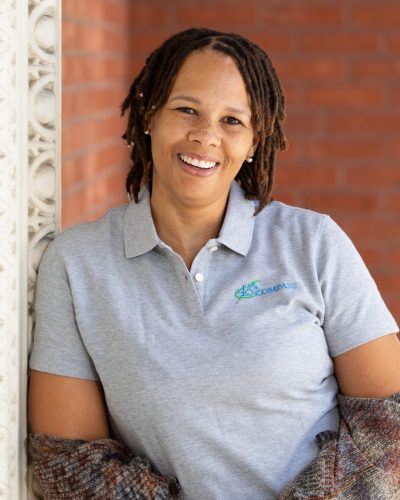Be the GPS, Not the Driver
 Contributions from Takia Fields-Palmer, Clinical Director
Contributions from Takia Fields-Palmer, Clinical Director
For the past 20 years, Takia Fields-Palmer has been working at COMPASS in many capacities within the Community Services program. Like many of COMPASS’ staff members, Takia was referred by a cousin who had been working at COMPASS. After having to reschedule her initial interview with Margy Nicholson, Director of Community Services, due to bad traffic, Takia started in June of 1999. When she first started, she was a Tracker, language used at the time to describe a mentor-like position for youth and families in need. She, being the only COMPASS staff member assigned to a case, would make three contacts with each youth and family during each week: one school visit, one community visit, and one home visit. “This started out as just a job to me,” recalls Takia, “but it has turned into a career.”
Takia has seen COMPASS evolve since she joined in 1999. “When I started, we were given beepers and paper maps to get around and communicate with our families,” remembers Takia. The growth of the Community Services program has been what has surprised her the most. She has seen the program at its lowest number of staff in 2008 (9 staff members) to the present when it boasts a staff of over 80. Takia has worked with many, many youth and families during her time at COMPASS with more than a few having a lasting impact on her. She remembers a particular client, a 13-year-old girl, who was not going to school for a multitude of reasons. After working with this youth for quite some time, Takia was able to get this girl to start attending school on a more regular basis. It is hard for staff sometimes not to know about the successes of their clients after COMPASS services are completed. Luckily, Takia received a phone call from this young lady a few years later asking for a reference for a job to which she was applying. Takia has carried this story with her ever since.
In late 2019, Takia accepted the challenging role of Clinical Director for the Community Services program. “I had never thought about pursuing this position before,” said Takia, “but this is the right time for me – I’m up for the challenge.” As Clinical Director, Takia guides Family Clinicians to use their individual strengths to work most effectively with families. In addition to each staff member’s individual skillset Takia coordinates trainings to further support staff development, such as bringing in experts about domestic violence and suicide. Further, Takia engages in individual and group supervision with Family Clinicians; her top priority being that the Clinicians are confident in their skills and able to best support their families.
From her 20 years of experience in the human service field, Takia often shares her tips and tricks for individuals working in this field. They are listed below (in no particular order):
- Self-care and patience are key. Taking care of yourself is extremely important to maintaining a healthy body and mind. Having plenty of patience with yourself and with your families is critical to providing a high-quality service that families deserve.
- Give everyone the same respect. Relationships are built upon mutual respect, and families need to know that we are not being judgmental – we are there to work with them to meet their goals.
- We are not experts on a family, the family is. In order to be successful with a family, we need to meet them where they are at. They are the ones that understand the nuances of the family dynamics and history. Our job is to be the GPS for the family, not the driver. The families are the ones taking control of their own situations – we are just providing some direction and guiding them to success.